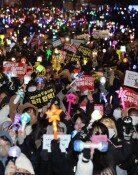Foreign currency debt exceeds 610 trillion won
Foreign currency debt exceeds 610 trillion won
Posted December. 14, 2024 07:55,
Updated December. 14, 2024 07:55
Political instability has continued since the 12/3 martial law incident, causing the won-dollar exchange rate to soar. Before the martial law event, foreign exchange authorities would intervene if the rate exceeded 1,400 won, but now the situation is so precarious that they must focus on defending the 1,450 won mark. The exchange rate itself poses a significant issue, but the ongoing political turmoil has further exacerbated fluctuations. Companies are so uncertain about the future that they are not even planning for next year.
The economic fallout from the prolonged high exchange rate is profound. An emergency has been declared for small and medium-sized companies burdened with significant foreign currency debts and poor credit ratings. As of the end of September, foreign currency debt for domestic companies and financial institutions surpassed 610 trillion won for the first time. This surge is due to the increasing burden of foreign currency debt, as the principal and interest payments have become more expensive with the rising exchange rate. Import prices have risen for two consecutive months since October, raising concerns that consumer prices may also climb as the exchange rate continues to surge.
Worries are also mounting that the sharp rise in the exchange rate will depress corporate investment and worsen economic growth. The National Assembly Budget Office has estimated that if the real exchange rate increases by 1%, facility investment could fall by around 0.9%, and real GDP could decrease by about 0.16%. Before martial law was imposed, the Bank of Korea predicted next year's growth rate to be 1.9%, but if the high exchange rate persists, the growth rate could drop to the mid-to-high 1% range. There are also concerns that if the rapid outflow of foreign currency causes foreign exchange reserves to dip below the $400 billion mark, it could negatively impact national credit.
The won-dollar exchange rate has been under upward pressure since the election of U.S. President Donald Trump. Additionally, China is contemplating yuan devaluation in response to U.S. tariff threats. Amid challenging external factors, exacerbating exchange rate instability due to political uncertainty is nearly self-destructive.







